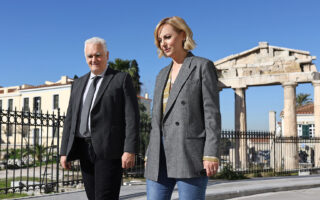Tourism: ‘How do you share it with the world and yet protect it?’ asks Bhutan PM

“Sustainability is always profitable in the long term,” Prime Minister Tshering Tobgay of Bhutan told the Reimagine Tourism in Greece conference in Athens on Wednesday.
Speaking during a conversation with Kathimerini English Edition Editor in Chief Tom Ellis, Tobgay outlined Bhutan’s “high-value, low-volume” tourism model, which includes charging a sustainable development fee of $100 per night per tourist.
In a country that has made it a matter of national policy to improve the happiness and well-being of its population, the revenue generated by this fee goes toward the country’s free education, healthcare, environmental conservation and cultural preservation.
Tourists traveling to the South Asian country of 750,000 residents must obtain a visa and pre-book hotels, guided tours and other activities before visiting.
“The guide will show you around the country and, as a result, most people are not willing to visit Bhutan,” Tobgay said. “But those that do visit Bhutan are determined to go on a journey, to leave something, to take something, to grow together with the country.”
Asked whether this approach is fair for visitors, he said: “Justice and fairness, I see it from two points of view – that of the tourist and that of the Bhutanese. If you open it in the interest of fairness to allow anybody to enter, it’s going to destroy what they are visiting.”
Tobgay praised Greece for conserving its ancient monuments and protecting fundamental principles like its civilization, art, culture, history, philosophy and democracy. “Very few other countries can create this magic,” he said. “The question is, is it too much magic?” asked Tobgay, comparing Greece’s 30 million annual tourists to Bhutan’s 170,000.
Referring to the “beautiful yet fragile island” of Santorini, Tobgay commented on the “tens of thousands of visitors” arriving from cruise ships, “coming in like ants.” He asked, “How do you share it with the world and yet protect it?”
“If I had any say in Santorini,” he added, “I’d say let’s impose a sustainable fee on every person from cruise ships. I would charge a lot of money.”
“Sustainability is expensive, but it is critical, because we have the responsibility of protecting what we have inherited for ourselves, but more importantly, keeping what we have for our future generations. That is sustainability, and for that, we must make wise choices. Some of them involve sacrifices, but sacrifices only in the immediate term – in the long term, it is always profitable,” Tobgay said.





